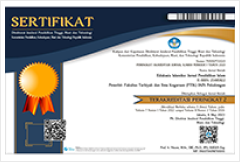Sitti Raihanun Zainuddin Abdul Madjid, Female Scholar of the 21st Century: Pioneer in Gender Transformation and Islamic Education in Lombok-West Nusa Tenggara
DOI:
https://doi.org/10.28918/jei.v9i1.7079Keywords:
Sitti Raihanun Zainuddin Abdul Majid, female scholar, 21st century, gender transformation, Islamic educationAbstract
This study reveals the central role of Sitti Raihanun Zainuddin Abdul Majid as a 21st-century female ulama and pioneer in gender transformation and Islamic education development in Lombok, West Nusa Tenggara. Designed with a qualitative descriptive method, this research explores Sitti Raihanun’s contributions to gender transformation in Islamic education in Lombok. Data collection involved in-depth interviews with Nahdlatul Wathan (NW) members and local community leaders, NW document analysis, and Sitti Raihanun’s speeches. Using a hermeneutic approach, data analysis techniques included a deep interpretation of historical, social, and cultural contexts. The study findings indicate that Sitti Raihanun is a NW leader and a woman who positively impacts education and Islamic values in West Nusa Tenggara. Key factors shaping her role include her family background, active involvement in NW, and inherited moral values. Leadership analysis depicts her success as an organizational leader and educator by establishing Islamic schools and pesantren. Despite being recognized as an heir, controversial views emerged regarding female leadership. The charisma inherited from her parents significantly impacted her role in NW, and her recognition as a member of the People’s Consultative Assembly (MPR RI) reflects her national influence. Another finding confirms that Sitti Raihanun applied a transformative and charismatic leadership model, which is evident in organizational dynamics, the establishment of educational institutions, and her national influence. This study provides a deep understanding of Sitti Raihanun’s transformative role, highlighting the complexity and dynamics of her leadership and positive contributions to gender transformation and community development through Islamic education.
References
Afiful Ikhwan, Abdurrahman, L., & Aldo Redho Syam. (2022). Kyai’s Charismatic Leadership in Shaping Students Personality at Islamic Boarding Schools. Edukasia Islamika, 7(2), 191–208. https://doi.org/10.28918/jei.v7i2.6118
Anggraeni, D., Muzayyanah, F., & Irfanullah, G. (2023). Pola Kepemimpinan Nyai Masriyah Amva terhadap Resiliensi Pesantren di Era Pendemi Covid -19. Hayula: Indonesian Journal of Multidisciplinary Islamic Studies, 7(1). https://doi.org/10.21009/hayula.007.01.07
Askarizad, R., & He, J. (2023). Gender equality of privacy protection in the use of urban furniture in the Muslim context of Iran. Local Environment, 28(10), 1311–1330. https://doi.org/10.1080/13549839.2023.2206642
Astuti, Yanti Dwi. (2021). Media dan Gender (Studi Deskriptif Representasi Stereotipe Perempuan dalam Iklan di Televisi Swasta). Profetik Jurnal Komunikasi, 9(2), 25–32. https://doi.org/ 10.14421/pjk.v9i2.1205.
Bengtsson, M. (2016). How to plan and perform a qualitative study using content analysis. NursingPlus Open, 2, 8–14. https://doi.org/10.1016/j.npls.2016.01.001
Blake, K., & Stalberg, E. (2009). Me and My Shadow: Observation, Documentation, and Analysis of Serials and Electronic Resources Workflow. Serials Review, 35(4), 242–252. https://doi.org/10.1080/00987913.2009.10765252
Bohren, M. A., Iyer, A., Barros, A. J. D., Williams, C. R., Hazfiarini, A., Arroyave, L., Filippi, V., Chamberlain, C., Kabakian-Khasholian, T., Mayra, K., Gill, R., Vogel, J. P., Chou, D., George, A. S., & Oladapo, O. T. (2024). Towards a better tomorrow: Addressing intersectional gender power relations to eradicate inequities in maternal health. eClinicalMedicine, 67, 102180. https://doi.org/10.1016/j.eclinm.2023.102180
Ch, Mufidah. (2010). Bingkai Sosial Gender: Islam, Strukturasi dan Konstruksi Sosial. UIN Maliki Press (Anggota IKAPI).
Connell, R. (2012). Gender, health and theory: Conceptualizing the issue, in local and world perspective. Social Science & Medicine, 74(11), 1675–1683. https://doi.org/10.1016/j.socscimed.2011.06.006
Daulay, Harmona, Meliala, Winda S, & Humaizi. (2019). Gender Analysis of Women Farmers (Case Study of Corn Farmers in Tigabinanga District Tigabinanga Subdistrict Karo). International Journal of Multicultural and Multireligious Understanding (IJMMU), 6(4), 115–124. http://dx.doi.org/10.18415/ijmmu.v6i4.953
Durrani, N., CohenMiller, A., Kataeva, Z., Bekzhanova, Z., Seitkhadyrova, A., & Badanova, A. (2022). ‘The fearful khan and the delightful beauties’: The construction of gender in secondary school textbooks in Kazakhstan. International Journal of Educational Development, 88, 102508. https://doi.org/10.1016/j.ijedudev.2021.102508
Ecevit, Y. (2013). Gendering social policy and welfare state in Turkey. Women’s Studies International Forum, 41, 1–6. https://doi.org/10.1016/j.wsif.2013.07.003
Ely Mufidah, Ismail, I., Hadjar, I., & Hakim, A. L. (2022). PRADAEC Learning Model in Determining the Success of al-Qur’an Hadith Cognitive Learning and as a Religious Moderation Among Students of Islamic Schools. Edukasia Islamika, 7(2), 172–190. https://doi.org/10.28918/jei.v7i2.6242
Fakih, Mansour. (2010). Analisis gender dan Transformasi Sosial. Pustaka Pelajar.
Falcetta, F. S., De Almeida, F. K., Lemos, J. C. S., Goldim, J. R., & Da Costa, C. A. (2023). Automatic documentation of professional health interactions: A systematic review. Artificial Intelligence in Medicine, 137, 102487. https://doi.org/10.1016/j.artmed.2023.102487
Fan, X., Wang, J., & Xiao, H. (2021). Women’s travel in the Tang Dynasty: Gendered identity in a hierarchical society. Annals of Tourism Research, 89, 103231. https://doi.org/10.1016/j.annals.2021.103231
Fitriyani, F., Saepuddin Jahar, A., Subhan, Z., & Rosdiana, R. (2023). The Judges’ Legal Consideration on Divorce of Nushūz Cases at the Kupang High Religious Court: Gender Perspective. Samarah: Jurnal Hukum Keluarga Dan Hukum Islam, 7(3), 1971. https://doi.org/10.22373/sjhk.v7i3.14425
Galvin, R. (2015). How many interviews are enough? Do qualitative interviews in building energy consumption research produce reliable knowledge? Journal of Building Engineering, 1, 2–12. https://doi.org/10.1016/j.jobe.2014.12.001
Ginsburg, O., Vanderpuye, V., Beddoe, A. M., Bhoo-Pathy, N., Bray, F., Caduff, C., Florez, N., Fadhil, I., Hammad, N., Heidari, S., Kataria, I., Kumar, S., Liebermann, E., Moodley, J., Mutebi, M., Mukherji, D., Nugent, R., So, W. K. W., Soto-Perez-de-Celis, E., … Soerjomataram, I. (2023). Women, power, and cancer: A Lancet Commission. The Lancet, 402(10417), 2113–2166. https://doi.org/10.1016/S0140-6736(23)01701-4
Gould, D., Hawker, C., Chudleigh, J., Drey, N., Gallagher, R., & Purssell, E. (2021). Survey with content analysis to explore nurses’ satisfaction with opportunities to undertake continuing professional education in relation to aseptic technique. Nurse Education Today, 98, 104749. https://doi.org/10.1016/j.nedt.2021.104749
Hennink, Monique, Hutter, Inge, & Bailey, Ajay. (2020). Qualitative Research Methods. Publications Limited.
Huang, M., Yang, L., Zhang, C., & Gan, X. (2024). Glucose management in critically ill adults: A qualitative study from the experiences of health care providers. Heliyon, e24545. https://doi.org/10.1016/j.heliyon.2024.e24545
Ismail, S. (2006). Peran Pesantren Syaikh Zainuddin Nahdlatul Wathan dalam Mencerdaskan Masyarakat Lombok Timur. Jurnal Al-Qalam, 14(2), 47–64.
Julia Cleves Mosse. (2002). Gender dan Pembangunan. Pustaka Pelajar.
Kania, Dede. (2015). Hak Asasi Perempuan dalam Peraturan Perundang-undangan di Indonesia. Jurnal Konstitusi, 12(4), 717–734.
Ladyanna, S., & Gyem, K. J. (2022). Islamic Religious Education through Habituation of Religious of Indonesian Muslim Children in Korea, Before and During the Covid-19 Pandemic. Edukasia Islamika, 7(2), 157–171. https://doi.org/10.28918/jei.v7i2.6055
Larasati, Ayu Maulidina & Ayu, Novia Puspa. (2020). The Education for Gender Equality and Human Rights in Indonesia: Contemporary Issues and Controversial Problems. The Indonesian Journal of International Clinical Legal Education, 2(1), 73–84. https://doi.org/10.15294/ijicle.v2i1.37321
Leong, P. T. M., & Tan, F. B. (2013). Narrative Interviews: An Alternative Method to the Study of Mentoring Adoption by Information Systems Project Managers. Procedia Technology, 9, 638–645. https://doi.org/10.1016/j.protcy.2013.12.070
Malikhah Towaf, S. (2008). Peran Perempuan, Wawasan Gender Dan Implikasinya terhadap Pendidikan di Pesantren. Jurnal Ilmu Pendidikan, 15(3), 141–149. https://media.neliti.com/media/publications/101774-ID-peran-perempuan-wawasan-gender-dan-impli.pdf
Muafiah, E. (2013). Pendidikan Perempuan di Pondok Pesantren. Nadwa | Jurnal Pendidikan Islam, 7(1), 90–108. https://journal.walisongo.ac.id/index.php/Nadwa/article/download/545/492
Muharam, R. S. (2020). Membangun Toleransi Umat Beragama di Indonesia Berdasarkan Konsep Deklarasi Kairo. Jurnal HAM, 11(2), 269.
Muhtadin, A. M. (2019). Hadits Misoginis Perspektif Gender dan Feminisme. At-Tibyan, 2(2), 16–34. https://doi.org/10.30631/atb.v2i2.1
Muqoyyidin, Andik Wahyun. (2022). Wacana Kesetaraan Gender: Pemikiran Islam kontemporer tentang Gerakan Feminisme Islam. Jurnal Al-Ulum, 13(2), 491–512.
Muzayanah, F., & Anggraeni, D. A. (2023). Leadership of Women Ulama During Pandemic in Pesantren: Study in Kebon Jambu Ciwaringin and Al-Baqaroh Lirboyo. Potensia, 9(1).
Nasri, U. (2015). Akar Historis Pendidikan Perempuan: Refleksi Pemikiran TGKH. Muhammad Zainuddin Abdul Madjid. Deepublish.
Olaosebikan, O., Abdulrazaq, B., Owoade, D., Ogunade, A., Aina, O., Ilona, P., Muheebwa, A., Teeken, B., Iluebbey, P., Kulakow, P., Bakare, M., & Parkes, E. (2019). Gender-based constraints affecting biofortified cassava production, processing and marketing among men and women adopters in Oyo and Benue States, Nigeria. Physiological and Molecular Plant Pathology, 105, 17–27. https://doi.org/10.1016/j.pmpp.2018.11.007
Prantiasih, Arbaiyah. (2012). Hak Asasi Manusia Bagi Perempuan. Jurnal Pendidikan Pancasila Dan Kewarganegaraan, 3(1), 101–115.
Shalihin, Nurus & Firdaus. (2019). Transformasi Gender: Strategi Pembebasan Perempuan dari Jerat Pembangunan dan Kapitalisme. SAWWA: Jurnal Studi Gender, 14(1), 109–140. https://doi.org/10.21580/sa.v14i1.3366
Shastri, Andrey. (2021). Gender Inequality and Women Discrimination. IOSR Journal And Social Science, 19(11), 27–30.
Sohn, Kitae. (2015). Gender Discrimination in Earnings in Indonesia: A Fuller Picture. Bulletin of Indonesian Economic Studies, 51(1), 95-121,. https://doi.org/10.1080/00074918.2015.1016569.
Syafrini, Delmira. (2014). Perempuan dalam Jeratan Eksploitasi Media. Humanus, 13(1), 20–27. https://doi.org/10.24036/jh.v13i1.4093.
Syamsudin. (2020). Eksploitasi Wanita dalam Perspektif Kapitalis. E-Jurnal Egalita, 1(2), 20–40. https://doi.org/10.18860/egalita.v0i0.1923.
Umar, Nasaruddin. (2010). Argumen Kesetaraan Jender Perspektif Al-Qur’an cet-VIII. Paramadina.
Vásquez-Vera, C., Fernández, A., Sánchez-Ledesma, E., Bennett, M., & Borrell, C. (2023). Gender-based differences in the meanings and uses of housing for health and everyday life: An intersectional approach. Women’s Studies International Forum, 99, 102761. https://doi.org/10.1016/j.wsif.2023.102761
Wallwey, C., & Kajfez, R. L. (2023). Quantitative research artifacts as qualitative data collection techniques in a mixed methods research study. Methods in Psychology, 8, 100115. https://doi.org/10.1016/j.metip.2023.100115
Wibowo, Dwi Edi. (2011). Peran Ganda Perempuan dan Kesetaraan Gender. Jurnal MUWÂZÂH, 3(1), 357–364.
Wieringa, Saskia E. (2015). Gender Harmony and the Happy Family: Islam, Gender and Sexuality in post-Reformasi Indonesia. South East Asia Research, 23(1), 27–44. https://doi.org/10.5367/ sear.2015.0244
Williamson, K., Given, L. M., & Scifleet, P. (2018). Qualitative data analysis. In Research Methods (pp. 453–476). Elsevier. https://doi.org/10.1016/B978-0-08-102220-7.00019-4
Yousaf, A., Yusuf, F., & Umrani, W. A. (2023). Creatures of a lesser god! Gender-based differences in HR attributions mediated by person-job fit: A poly-contextual analysis. Personnel Review, 52(7), 1842–1860. https://doi.org/10.1108/PR-08-2021-0597
Zhan, T., Wang, L., Yan Wang, & Sun, C. (2023). Master of nursing specialist experiences of an internship through the use of written reflections: A qualitative research study. Heliyon, 9(2), e13299. https://doi.org/10.1016/j.heliyon.2023.e13299
Zhu, X., Oberman, T., & Aletta, F. (2024). Defining acoustical heritage: A qualitative approach based on expert interviews. Applied Acoustics, 216, 109754. https://doi.org/10.1016/j.apacoust.2023.109754
Zubair, Asni, Hamzah, & Satriadi. (2022). Living Religious Moderation within the Sipakatau, Sipakainge’, and Sipakalebbi Cultures of the Bugis Community. Walisongo: Jurnal Penelitian Sosial Keagamaan, 30(2), 195–214. https://doi.org/10.21580/ws.30.2.13048
Zuhrotun, Ni’mah Siti & Al, Chasna Mienchah. (2021). Hadith about Women’s Reproductive Rights: A Critical Study. Al-MAIYYAH: Media Transformasi Gender Dalam Paradigma Sosial Keagamaan., 14(2), 104–116. https://doi.org/10.35905/al-maiyyah.v14i2.749























